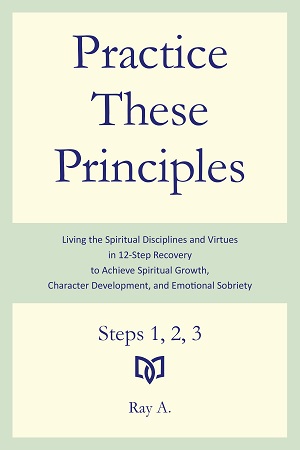
"With Step 3 we come to a turning point in our recovery. Our ability to work the rest of the Steps and to practice the principles of the program in all our affairs rests upon the choice that we make here.
In Step 2 we come to believe. In Step 3 we act upon that belief and enter into a relationship with God. Our decision to turn our will and our lives over to the care of God as we understand him opens the way to this relationship. This decision brings us to a faith that works and allows a Power greater than ourselves to restore us to sanity.
Steps 1 and 2 are preparatory Steps. Their objective is to bring us to the decision we make in Step 3. Sometimes called the “surrender Steps,” these three Steps take us through a process of spiritual and emotional change summed up in a simple AA formula: “I can’t. He can. I’ll let Him.” We move from admitting we can’t fix ourselves, to accepting there is a Power who can heal us, to letting that Power work in our lives. We come to acknowledge that Power to be God, as we understand him. We become willing to surrender our self-will and our self-directed lives, not only as regards the problem of alcohol, but in all that we do.
We work Step 3 through seven primary principles. These are the disciplines of surrender and prayer, and the virtues of humility, willingness, acceptance, serenity and faith. The practice of these principles is directed toward one aim: entrusting our will and our lives to the care of God. By this we seek a spiritual transformation whereby, from a natural inclination to self, we become habitually inclined toward God. We move from self-seeking to seeking God and his will for us. We aspire to a spiritual condition best described by the Big Book as one of complete abandon. Finding our rest in God, we find that we are free at last.
The Spiritual Malady, or the Nature of the “Ism”
We are not likely to understand much if any of this when we first come to this Step. In fact, the words of Step 3 may have no practical significance for us. For some, this may remain the case for a very long time. What does it mean to turn my will and my life over to the care of God? What exactly do I do? We find it hard to wrap our minds around what appears to be a rather elusive concept, if not an altogether unlikely proposition.
The words don’t register and we gloss over them. Sometimes we write them off as no more than a well-meaning ideal. In either case we are not particularly inclined to practice the Step. Still, we are told that the entire program hinges on this Step. We can hardly afford to ignore it or give it lip service or put it on the shelf till a later date.
For some of us the difficulty with Step 3 arises from a continuing resistance to the spiritual nature of the AA program, much as we saw with Step 2. For others, it arises from a lack of clarity about the spiritual nature of the alcoholic disease.
When we say that alcoholism is a threefold disease, we can readily name the physical and the mental aspects of the illness. We say we suffer from an allergy of the body and an obsession of the mind. Using different language we may say that we have a physical and a mental susceptibility to alcohol that makes us addicted to it. Yet when it comes to the spiritual root of our disease, we lack a single, transparent word like allergy, obsession or addiction to refer to it.
Unable to name the spiritual malady, we are left with a vague and general notion of how it is that we are spiritually afflicted. At times we may even wonder whether there is such a thing as a spiritual disease, whether the concept amounts to no more than a religious interpretation of a problem that is really an emotional extension of the mental obsession, and which is best explained by secular psychology or by one of the newer sciences that study the brain. The situation is analogous to that which we face with regard to “these principles.” They are fundamental to understanding and practicing the program, yet we can’t quite get a handle on them.
Even if we concede that we might have some sort of a spiritual problem, and even if we are open to taking the steps the program proposes, a lack of clarity cannot but affect our practice. Many of us spend years with the uneasy feeling that we have not made that much progress with Step 3, that maybe we have not really “taken” it. When our recovery falters, we suspect it has something to do with that Step, but we can’t put our finger on it. Some of us may figure that it has something to do with faith, but we are at a loss to see how and to translate that understanding into action."
– From "The Turning Point," pp. 151–153
For more PTP123 Excerpts, please click on link.